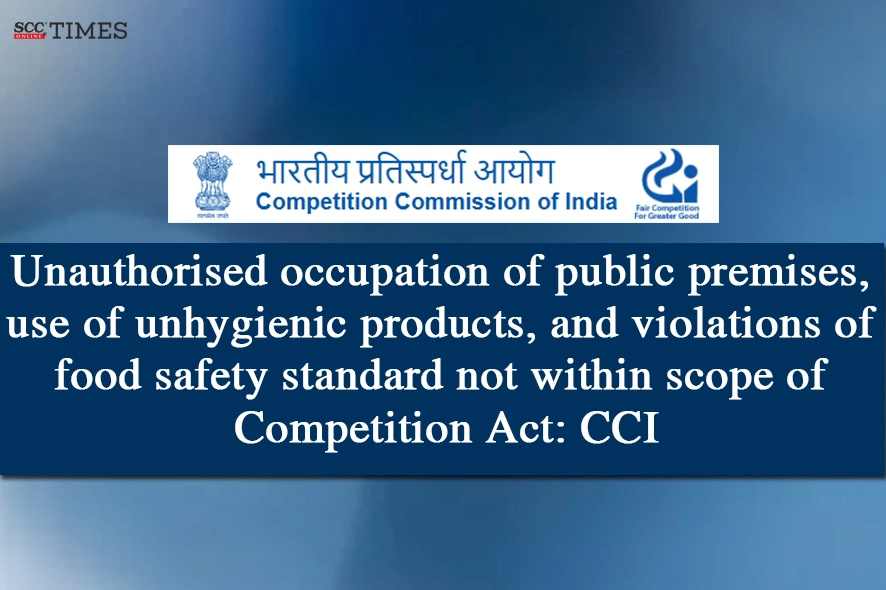Competition Commission of India: A complaint was filed by the Informant under Section 3 of the Competition Act, 2002 (‘2002 Act’), alleging anti-competitive agreement or conduct by a juice corner operator-Opposite Party. A Bench comprising of Ravneet Kaur (Chairperson), Anil Agrawal (Member), Sweta Kakkad (Member), and Deepak Anurag (Member), held that the Opposite Party was operating independently, and actions such as selling products at low prices or operating without licenses were not considered violations under Section 3 of the 2002 Act, by an entity who was not a significant market player. It was also held that unauthorised occupation of public premises, alleged use of unhygienic products, and violations of food safety standards did not fall within the scope of the 2002 Act.
Background
The Informant filed a complaint against the Opposite Party, alleging contravention of Section 3 of the 2002 Act. The Informant was allotted a shop at a hospital via an allotment letter dated 23-3-2022 and signed a Lease and License Agreement on 15-4-2022. The Opposite Party did not vacate the premises, preventing the Informant from taking possession. Despite a representation on 25-6-2022, the authorities declared the agreement null and void on 24-9-2022, citing failure to materialise the lease cum license agreement within 90 days. The Informant was offered a refund of security deposit and later allotted a shop on 4-3-2024, where he began business under a new name.
The Informant alleged that there was a sharp decline in sales after starting his new business, attributing it to the Opposite Party selling cooked food from unhygienic and unknown sources at below manufacturing cost, leading to unfair competition in respect to vendors who were complying with all the regulations.
The Opposite Party was reportedly selling various food items like samosa, momos, idli, dosa, and non-food items like sanitary napkins, CDs, and toiletries, etc. without required license. The Informant claimed that he incurred Rs 3,50,000 to purchase furniture and equipment for the prospective shop but due to the Opposite Party’s refusal to vacate the originally allotted shop, he sustained irreparable pecuniary loss. A complaint was submitted on 12-12-2024, and authorities sought the Opposite Party’s response on 14-1-2025. The Informant also alleged that the Opposite Party had illegally occupied public premises, causing disruption and unfair competition for other vendors. Apart from unfair trade practices and illegal occupation, the Informant had raised concerns of public nuisance, health risks, and environmental disruption due to the Opposite Party’s activities.
The Informant prayed for (a) removal of the Opposite Party’s illegal occupation, (b) ensure that the Opposite Party complied with applicable laws and regulations for food safety and trade, (c) investigation of unfair trade practices, and (d) resolution of public nuisance caused by unauthorized food sales.
Analysis, Law, and Decision
The CCI reviewed the allegations under Section 3 of the 2002 Act, which prohibited anti-competitive agreements. Upon examination, it found no allegation or evidence of any agreement, whether horizontal or vertical, between the Opposite Party and its competitors or suppliers that could potentially restrict competition. The Opposite Party appeared to be operating independently, and actions such as selling products at low prices or operating without licenses were not considered violations under Section 3 of the 2002 Act, by an entity who was not a significant market player.
Furthermore, the CCI noted that the Informant failed to submit credible evidence indicating any anti-competitive agreement or conduct. The information provided was considered vague and insufficient to establish a prima facie case under Section 26(1) of the 2002 Act and no competition issue arose in the present case. The CCI also noted that issues like unauthorized use of public premises and alleged food safety violations did not fall within the scope of the 2002 Act. The CCI concluded that no case under Section 3 of the 2002 Act was made out, and thus, the matter was closed under Section 26(2) of the 2002 Act.
[N. Mohan Rao v. Bishal Juice Corner, 2025 SCC OnLine CCI 76, decided on 26-8-2025]


